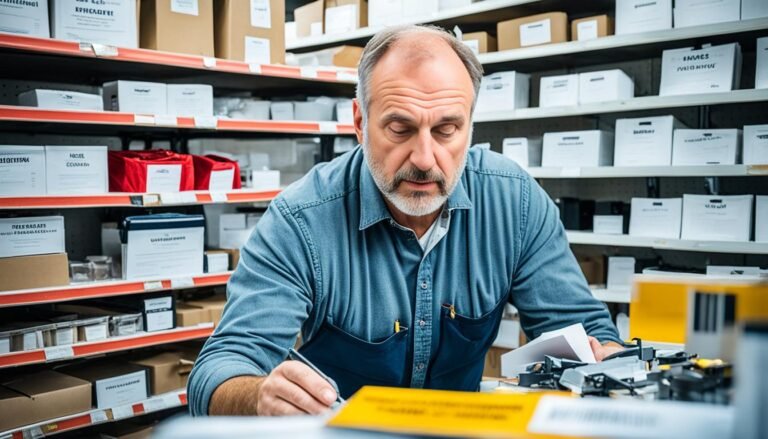Copyright Protection Tips for SMEs
Small and medium-sized enterprises (SMEs) are often at risk for copyright infringement. This means they’re more likely to have their creative works stolen.
It’s vital for SMEs to protect their intellectual property. This protects their creative works and ensures they follow copyright laws. It also helps keep their trademarks and copyrights secure.
SMEs should put in place effective copyright protection measures. This safeguards their valuable intangible assets and stops others from stealing their work.
Key Takeaways:
- Small and medium-sized enterprises (SMEs) are at a higher risk of copyright infringement.
- Copyright protection safeguards your creative works and ensures compliance with copyright laws.
- Implementing effective copyright protection measures is crucial for SMEs to secure their valuable intangible assets and prevent infringement.
Why Copyright Protection is Important for SMEs
Copyright protection keeps the special works and ideas of small companies safe. By following copyright laws, businesses protect what makes them unique. This helps them keep their special creations from being copied.
Small businesses own certain rights to their new ideas and brand. Following copyright laws lets these businesses keep control over their new creations. They can be the only ones to use and profit from their work.
It’s important to protect your business’s name and logo. This stops others from using things that look like yours. Your items won’t get confused with someone else’s. Maybe you’ve seen the ™ or ® symbols. These show something is a trademark.
It’s also key to protect written, artistic, or musical creations. This protection stops others from copying those works. SMEs keep the right to decide who can use their creations.
“Implementing copyright protection measures is essential for SMEs to secure their intellectual property and prevent infringement.”
Getting the right advice on copyright law is key for small businesses. Meeting with a lawyer who knows small business copyright rules can help a lot. They can help you follow the law and protect your work.
It’s also smart to keep learning about copyright. Laws can change, so staying updated helps you protect your work better. This way, you can always make smart choices about keeping your work safe.
Safeguarding Intellectual Property as an SME: A Case Study
Take XYZ Corporation, for example. They knew their designs needed protection. By getting their designs copyrighted, they stood out in the market. This protected their brand and helped them stay ahead of their competition.
Securing Copyrights as an SME: Practical Tips
For small companies, there are simple ways to protect your work:
- Learn about copyrights and trademarks with your team.
- Decide what’s valuable and register it, like your brand’s name or special works.
- Get advice from a copyright lawyer to make sure you’re doing everything right.
- Put copyright notices on your work. And get written permission if you want to use someone else’s work.
- Keep an eye out for copies of your work and act fast if you need to.
By following these steps, you can protect your business’s creative work and brand. Remember, getting legal advice is crucial to do this the right way.
Common Reasons SMEs Overlook Copyright Protection
Many small and medium-sized enterprises (SMEs) don’t protect their copyrights well. Often, they’re not aware of intellectual property rights. This can lead to big risks for their business. Having not enough funds is another issue. It makes it hard for SMEs to pay for legal help or protect their copyrights.
It’s vital for SMEs to know how important copyright protection is. Taking steps to secure their intellectual property is key. Not doing so could lead to someone else stealing their work. By focusing on copyright protection, SMEs can keep their content safe and under their control. They prevent others from using it without permission.
How copyright infringement prevention strategies benefit SMEs
Getting the right strategies in place to stop copyright infringement is vital. It protects their creative rights and keeps their business safe. Here’s why it’s so important:
- Preserving creative works: It helps keep SME’s original content safe. This means others can’t use it without permission.
- Enhancing competitiveness: Protecting their copyrights makes SMEs more trusted. This encourages more people to work with them.
- Encouraging innovation: It pushes SMEs to keep making new and interesting things. This helps them stand out in their industry.
- Securing commercial opportunities: They can sell or use their copyrighted works for business growth. It opens up new chances for them to make money.
“Copyright infringement prevention strategies are critical for SMEs. They help keep their creative works safe and keep them ahead in their industries.” – [Expert Name]
By putting in place copyright protection, SMEs can avoid the risks of infringement. This helps them build a strong presence and be respected in the business world. To make this clearer, let’s look at a comparison:
Table: Impact of Copyright Protection on SMEs
| | SMEs without copyright protection | SMEs with copyright protection |
|—————————|———————————|——————————-|
| Prevention of infringement | Vulnerable to unauthorized use and reproduction of their creative works, leading to potential loss of revenue and reputation | Proactive measures in place to discourage copyright infringement and protect the business’ valuable intellectual property |
| Control over original content | Limited control over the use and distribution of their creative works | Maintain exclusive rights to control, distribute, and monetize their original content |
| Legal recourse | Minimal legal protection in the event of copyright infringement | Possess legal rights and remedies to pursue legal action against infringers |
| Partnerships and collaborations | Potential partners and collaborators may hesitate to engage with SMEs due to concerns about copyright infringement | Credibility and trustworthiness attract partnerships and collaborations with like-minded businesses that respect intellectual property rights |
This comparison highlights the benefits of copyright protection for SMEs. It shows how it can lead to more opportunities and growth. It also shows that protecting copyrights helps build a creative and innovative atmosphere.
Tips for Copyright Protection for SMEs
Small and medium-sized enterprises (SMEs) often find it hard to protect their copyrights and intellectual property. Yet, there are ways for SMEs to keep their creative works safe. This helps ensure their business interests are protected, too.
Understand Different Types of Intellectual Property
To protect your copyrights well, you must know about different kinds of intellectual property. This stuff includes copyrights, patents, trademarks, and trade secrets. Learn what each one covers and its limits. Then, you can make smart moves for your business.
Consult with a Qualified Attorney
Dealing with copyright protection can be complex. So, it’s smart to get advice from an attorney who knows intellectual property law. A copyright specialist can help with filing, getting protection for your works, and advising on how to avoid infringement.
Stay Up to Date on Copyright News and Trends
Because things change quickly, it’s important to keep up with copyright news. This lets SMEs protect their creative works and adjust to the industry’s changes. Subscribe to updates, attend events, and join online groups to stay informed.
“The more you know about copyright law and the latest trends, the better prepared you’ll be to protect your creative works as an SME.”
Create a Copyright Protection Policy
Making a clear copyright policy is key for small businesses. This policy should lay out how to deal with copyright issues, like getting proper licenses and ensuring correct authorship. Having rules in place helps your team know how to protect your intellectual property.
Monitor and Enforce Your Copyrights
Keep an eye on how your copyrighted materials are used, both online and off. If you spot any misuse, report it and take legal steps as needed. This shows that you’re serious about protecting your creative work and can help prevent further misuse.
| Tips for Copyright Protection: Small Business Copyright Advice | |
|---|---|
| Understand Different Types of Intellectual Property | |
| Consult with a Qualified Attorney | |
| Stay Up to Date on Copyright News and Trends | |
| Create a Copyright Protection Policy | |
| Monitor and Enforce Your Copyrights |
Importance of IP Audits and Protection Plans
Small and medium-sized enterprises (SMEs) need to know the value of their intellectual property. It’s important to protect their trademarks and copyrights. SMEs should regularly check their IP and create protection plans. This helps them understand what they own and the risks they face.
An IP audit gives SMEs a clear view of their intellectual property. It helps them see where they need more protection and how to guard their assets. These steps ensure SMEs know the worth of their IP, making smart choices to keep it safe.
The Benefits of IP Audits and Protection Plans
IP audits find weaknesses that could harm SMEs’ IP. They look at how SMEs manage their rights and spot areas that need work. With this information, SMEs can make better protection plans to keep their property safe.
“IP audits let SMEs see their valuable assets clearly and find any weak spots. A plan is then made to protect their rights.” – Sarah Thompson, Intellectual Property Attorney
These audits also check if current IP protection is working well. They make sure SMEs follow copyright laws and are ready to fight off copycats. Creating solid protection plans helps SMEs take a proactive stance against infringement.
Creating an Effective IP Protection Plan
SMEs use their IP audit findings to make a detailed protection plan. This includes steps like registering trademarks and copyrights. They also set rules to protect secrets and make sure everyone knows how to help.
Plans for protecting IP must be checked and updated often. This keeps the plans useful against new risks. SMEs need to be ready for anything challenging their IP rights.
By performing IP audits and having solid protection plans, SMEs keep their intellectual property secure. This effort not only defends their trademarks and copyrights. It also helps in the long-term growth of their business.
Implementing an Effective IP Protection Plan
After creating an IP protection plan, SMEs must put it into action. This will help them keep their creative works safe and follow copyright laws. It also ensures their trademarks and copyrights are secure.
Training Employees
Educating workers on IP protection’s importance is key. This teaches them about copyright laws and why it’s crucial to protect trademarks and copyrights. They’ll learn how to value IP, avoid legal issues, and keep IP safe.
Monitoring and Enforcing IP Rights
SMEs should watch over their IP rights carefully. By keeping an eye on their property, they can stop any unauthorized use quickly. They might check for copyright infringements, keep tabs on competitors, and take steps to prevent infringement.
Ensuring Compliance with Copyright Laws
Sticking to copyright laws is vital for protecting IP. SMEs need to know the latest copyright rules. They should give credit for copyrighted material, get permission when needed, and attain licenses to use others’ works.
“The effective implementation of an IP protection plan requires training employees, monitoring and enforcing IP rights, and ensuring compliance with copyright laws.”
Regularly Reviewing and Updating the IP Protection Plan
Keeping the IP plan up to date is crucial. With the business world always changing, SMEs must update their efforts to protect IP. Regular checks can spot any weak points, so they can improve protection for their trademarks and copyrights.
An effective IP plan helps SMEs avoid IP theft and stay compliant. It also safeguards their important trademarks and copyrights.
| Benefits of Implementing an IP Protection Plan | Actions to Take |
|---|---|
| 1. Greater awareness and understanding of IP rights | Train employees on copyright law compliance for SMEs |
| 2. Proactive identification and prevention of IP infringement | Implement monitoring measures and enforce IP rights |
| 3. Reduced risk of costly litigation and reputational damage | Ensure compliance with copyright laws and obtain necessary licenses |
| 4. Enhanced competitiveness and value of IP assets | Regularly review and update the IP protection plan |
Case Studies: Successful IP Management Strategies
Real-life examples of how to manage intellectual property (IP) well can teach a lot to small and medium enterprises (SMEs). By looking at what different companies have done, SMEs can learn to protect their intellectual property. We will look at two studies that show how important it is to stop copyright violations and to keep your IP safe as a small or medium business.
Case Study 1: AlgaEnergy
AlgaEnergy is a top-notch biotech company from Spain. It knew it was crucial to keep their intangible assets safe. They put in place a detailed plan to protect their IP. Here are some things they did:
- They got proper licenses and patents to protect their new ideas and technologies.
- They made everyone they work with sign strict confidentiality agreements. This was to stop anyone from sharing or misusing secrets.
Thanks to these efforts, AlgaEnergy kept their knowledge safe. They also stopped fake products from hitting the market.
Case Study 2: D3O
D3O knows a lot about making materials for safety wear. It talks about the importance of doing deep research and analyzing if their work is really their own. They wanted to avoid using the same ideas that others already had and to find new ways to solve problems. Here’s how they did it:
- They spent a lot of time and effort on research to make sure their ideas were truly unique.
- They checked to see if they could use their ideas without stepping on the rights of others through a big legal check.
With these steps, and by properly protecting their IP, D3O sailed through challenges. This allowed them to protect their new products and technologies.
Learning from AlgaEnergy and D3O’s stories helps SMEs know how to manage their IP well. If small and medium businesses use similar methods, they can keep their creative work safe. This way, they can stand out in the market and avoid their work being copied.
Assistance for SMEs in IP Protection
Keeping your intellectual property safe is key for your small business to grow. Luckily, there are places you can turn to for help. The Enterprise Europe Network and the European IP Helpdesk are here to guide small and medium-sized businesses (SMEs).
These places can offer you smart advice on handling your IP. They’ll review your IP stuff, showing you how strong and valuable your assets are. With their help, you can plan the best ways to protect your creations.
They also help with copyright, trademarks, and patents. They’ll guide you through the complex IP world, helping you protect your work and brands. This gives you more confidence in owning your ideas.
Commercializing Intellectual Property
But it’s not just about protection. They can help SMEs turn their IP into money, too. They’ll find you chances to sell or share your IP, like through partnerships or licenses.
And there’s more. They can also help you find funding to grow your business. This funding can make sure you have what you need to strengthen your brand and designs.
Your intellectual property can set you apart in business. By using the advice and help from the Enterprise Europe Network and the European IP Helpdesk, you can make the most of your IP. This protects your brand’s future success.
Conclusion
Copyright protection is key for small and medium-sized enterprises (SMEs) to keep their creative works and intellectual property safe. They can do this by putting in place copyright protection methods. And also by doing IP audits and making IP protection plans. This way, SMEs can guard their valuable intangible assets and stop others from copying them.
Understanding the value of copyright protection is crucial for SMEs. Taking steps to protect their rights is important. Groups like the Enterprise Europe Network and the European IP Helpdesk are there to help. They offer guidance and resources for dealing with the challenges of IP protection.
Focusing on copyright protection gives SMEs more power over their original works. This helps stop others from using them without permission. Protecting copyrights matters for keeping ahead in the business world. It gives SMEs an edge in the market.
FAQ
Q: Why is copyright protection important for SMEs?
A: Copyright protection is key for SMEs. It guards their creative works and intellectual property rights. This ensures they follow copyright laws and look after their trademarks and copyrights.
Q: What are common reasons SMEs overlook copyright protection?
A: Several SMEs skip copyright protection. They might not fully know about intellectual property rights and their business impacts. Or they don’t have the money for legal help. Some just don’t understand how it benefits their work.
Q: What are some tips for copyright protection for SMEs?
A: SMEs have a few steps they can take. They should educate themselves on intellectual property. Talking to a lawyer is always a good idea. Keeping updated on copyright news is also important. Doing an IP audit and making a protection plan are key actions.
Q: Why are IP audits and protection plans important?
A: IP audits let SMEs see what’s strong and weak in their intellectual property. They point out where a company’s IP might not be safe. IP protection plans help outline how to safeguard patents, trademarks, and copyrights.
Q: How can SMEs implement an effective IP protection plan?
A: To set up a good IP protection plan, SMEs should teach employees about its importance. They need to watch and enforce IP rights, and ensure they obey copyright laws. Keeping the plan updated is also critical.
Q: Can you provide examples of successful IP management strategies?
A: Yes. AlgaEnergy, a Spanish biotech firm, has a strong IP strategy. And D3O, which makes protective materials, found success by researching well. They avoided wasting resources and found new ways to problem-solve.
Q: Is there assistance available for SMEs in IP protection?
A: Indeed, help is out there for SMEs. The Enterprise Europe Network and the European IP Helpdesk give advice and resources. They help with evaluating IP portfolios and offer protection strategies. Plus, there are funding options and support programs.
Q: Why should SMEs prioritize copyright protection?
A: SMEs need to focus on copyright protection. It saves their creative works and intellectual property rights. With proper measures, audits, and protection plans, they can keep their assets safe from theft.







